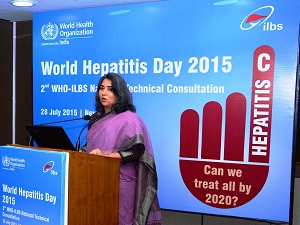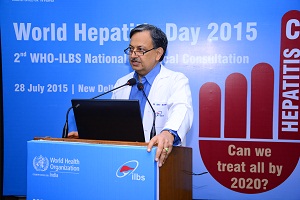
Every year on 28 July, WHO and partners mark the World Hepatitis Day to increase awareness and understanding about viral hepatitis and the diseases that it causes.
The theme for this year is Prevent hepatitis. Act now .
Combating hepatitis is one of the indicators for the post 2015 health and development agenda. In the South-East Asia Region of WHO; 100 million people are currently estimated to be living with hepatitis B and 30 million with hepatitis C. In India, viral hepatitis is now recognised, as a serious public health problem with an estimated 6-12 million hepatitis C virus (HCV) infected people with limited access to testing and treatment facilities. These numbers place a huge disease, social and economic burden on the affected individual and family, as well as the health system.
Dr Poonam Khetrapal Singh, WHO Regional Director for South-East Asia, “Governments need to ensure adequate and equitable access to hepatitis prevention and control measures. However, the responsibility also lies with individuals. Nearly 65% of people living with chronic hepatitis B and 75% of those with chronic hepatitis C are unaware that they are infected. We are living with this risk and unless we act now, it can be catastrophic. WHO is supporting countries to adopt data-driven and evidence-based policies to prevent, screen and treat hepatitis infections. Nearly 40% of those infected with hepatitis B and 80% of those with hepatitis C require life-long medical treatment, making access to affordable prevention and treatment for viral hepatitis an absolute necessity.”
To discuss the recent advances and new opportunities for hepatitis C treatment, WHO and its collaborating centre, Institute of Liver and Biliary Sciences (ILBS) organized a day-long consultation focusing on “Hepatitis C: Can we treat all by 2020?”.
Globally and in India, there are opportunities for treating hepatitis C using the new directly acting antivirals (DAA), which have more than 90% cure rate in majority of the patients. The cost of treatment in India is also expected to reduce with the production of generic DAAs. The day-long consultation will deliberate on HCV epidemiology in India, WHO prevention in health care settings, HCV screening and diagnosis, HCV Service Delivery Model and cost of drugs and diagnostics.

In the inaugural session, Dr. Sarin, Director, Institute of Liver and Biliary Sciences (ILBS) said, “Unlike Hepatitis B & HIV, Hepatitis C has a cure so elimination of this disease is possible. As it’s similar in almost all aspects to HIV, I would recommend merging Hepatitis C testing with NACO, making it NAHCO. It is a dream to make the antiviral drugs for Hepatitis C available at the primary care levels.”
In her address, Dr Asheena Khalakdina, Team Leader, Communicable Diseases, WHO Country Office for India said, “I would strongly urge that collectively, we should focus on stamping out unsafe medical practices like reuse of needles and syringes. As part of Universal Health Coverage, we should also aim to providing universal access to hepatitis C treatment in India.”
To further strengthen the efforts of providing universal access to hepatitis treatment in India, WHO formally announced the Institute of Liver and Biliary Sciences (ILBS) New Delhi as a WHO Collaborating Centre for Viral Hepatitis and Liver Diseases on 5 May 2015.
ILBS is the first WHO Collaborating Centre on viral hepatitis treatment in Asia and the second in the world after the US Centres for Disease Control Division of viral hepatitis in Atlanta. The Centre primarily focuses on: building capacity of clinicians and lab technicians; contributing to global research for cost-effective patient monitoring and treatment; and establishing models for delivering treatment at decentralized level, within the existing health system.
For the first time, the World Health Organization (WHO) issued guidelines dealing with hepatitis C treatment in 2014, and these complement existing guidance on the prevention of transmission of bloodborne viruses, including HCV.
This World Hepatitis Day, WHO calls upon national and state governments, all relevant UN agencies, partners and other stakeholders to include prevention, diagnosis and treatment of viral hepatitis in their respective work programmes and work in close collaboration.
